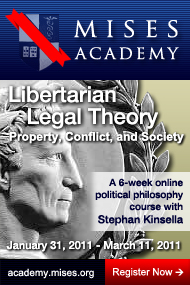Study Libertarian Legal Theory Online with Stephan Kinsella
Libertarian Theory
From the Mises Blog:
Study Libertarian Legal Theory Online with Stephan Kinsella
December 6, 2010 by J. Grayson Lilburne
Murray Rothbard wrote in the preface of his The Ethics of Liberty:
“While the book establishes the general outlines of a system of libertarian law, however, it is only an outline, a prolegomenon to what I hope will be a fully developed libertarian law code of the future. Hopefully libertarian jurists and legal theorists will arise to hammer out the system of libertarian law in detail, for such a law code will be necessary to the truly successful functioning of what we may hope will be the libertarian society of the future.”
Throughout his career, Stephan Kinsella has been doing just that. And now, after years of researching and developing the subject, he’s offering a 6-week, online course on libertarian legal theory starting January 31 through the Mises Academy. Kinsella’s new course: “will provide detailed discussions of the foundations of libertarian theory and related topics such as individual rights; justice, punishment and restitution; anarchy and minarchy; contract theory; inalienability; property rights and homesteading; intellectual property; legislation versus common law; legal positivism; Austrian economics and libertarianism; and causation and responsibility.”
Click here for an outline of what will be covered each week, and to sign up!
Study Libertarian Legal Theory Online with Stephan Kinsella Read Post »

